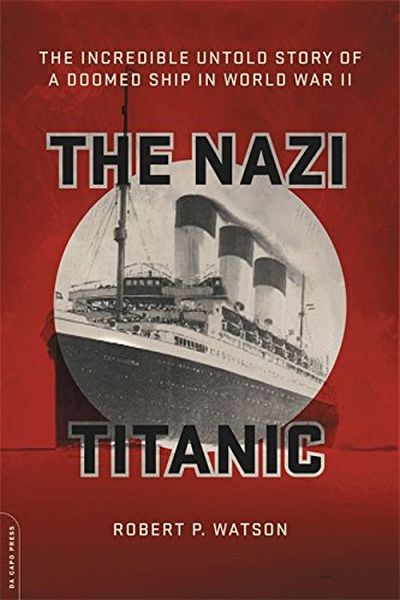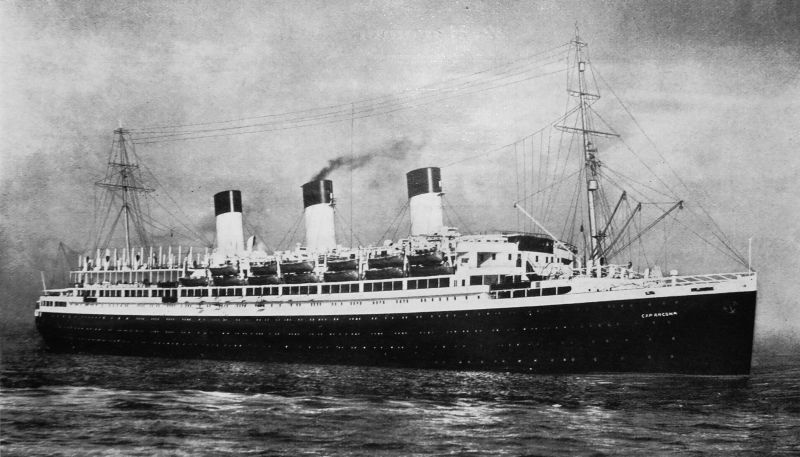| Title: | The Nazi Titanic |
| Subtitle: | The Incredible Untold Story of a Doomed Ship in World War II |
| Author: | Robert P. Watson |
| Publisher: | Da Capo Press |
| Published: | 2016 |
| Pages: | 292 |
| Language: | English |
| ISBN: | 9780306825439 |
| Special: | Also read the interview with Robert P. Watson |
| Review: |
"The Nazi Titanic" is the story about the German liner Cap Arcona, the ship that was used in 1942 in the German propaganda film "Titanic", which was published in 1943 by Universum Film AG in Berlin. However the Cap Arcona is not commonly known as a film star but as a floating concentration camp. As such the ship was sunk by British warplanes in the last days of World War II, taking 4,500 prisoners from the concentration camp Neuengamme down with her. The book`s somewhat bombastic title makes one think of a program broadcasted by Discovery Channel or National Geographic, but is in fact a well-considered choice made by author Robert P. Watson. The subtitle of the book is also a little screaming, but in the United States, where the book was originally written and published, this is quite common. Cap Arcona`s history is presented in much detail in the article "Drijvende concentratiekampen in de Lübecker Bocht" on this website (www.go2war2.nl) . The only achievement of the ship that was not mentioned in the article was the role the ship got in the motion picture about the most famous ocean liner of all times: Royal Mail Ship Titanic. Joseph Goebbels, the propaganda minister of the Third Reich, wanted to make a film about RMS Titanic in which was emphasized that the British capitalists were to blame for her loss. According to the script, Titanic`s owners would only have been interested in profit and in an attempt to break the trans-Atlantic speed record they were pushing the captain to navigate too fast trough an ocean littered with icebergs. However the director hired by Goebbels, Herbert Selpin, was very demanding and one of his requirements was to use the Cap Arcona as a stand-in for Titanic. Subsequently, with permission of Goebbels, the ocean liner was prepared for the recordings resulting in much higher expenses, both in terms of money and time. A short time after the recordings of the film were finished, Selpin publicly criticized both the Nazi’s and the Wehrmacht and was subsequently accused of treason and arrested. Later he died in his cell under very suspicious circumstances. Nowadays the film is recognised as one of the very few cinematographic highlights among the Nazi propaganda films. However, author Watson does not allow the complete story about the Cap Arcona to be dominated by its film role, even though the title is a little misleading about that. Robert P. Watson is a very experienced writer and editor and has published three dozen nonfiction books, two encyclopaedia sets and hundreds of scholarly journal articles. A frequent media commentator, he serves as the political analyst for WPTV 5 (NBC) in Florida. One of his most recent books, "America`s First Crisis", received the 2014 Gold Medal in History from the Independent Publishers` Association. The author lives in Boca Raton, Florida. The authors good reputation can be established all over "The Nazi Titanic". It is clear that he has undertaken a lot of research and he is able to answer all questions emerging from the story. Often he is ahead of any readers questions by explaining more about persons, ships, planes, concentration camps and even miscellaneous circumstances, appearing in the book. Doing so he builds a storyline best comparable with a Christmas tree that also consists of both long and short branches sticking out from the trunk. Any reader who is not discouraged by this kind of construction awaits a nice and shiny peak in the top. That peak, this climax of the book, is not just shaped by a well explained conclusion or a list of casualties who fell on that fateful 3 May in 1945. The highlight of the book is formed by something almost no single writer of historic books dares: Robert P. Watson had the courage to make a statement on the claim about the guilt concerning the destruction of the floating concentration camps in the Lübecker Bucht. This statement provides added value to "The Nazi Titanic" because it shows that the author has discovered almost all facts, or maybe even all of them, and interpreted them correctly. |
| Rating: | |
Information
- Translated by:
- Peter Kimenai
- Article by:
- Peter Kimenai
- Published on:
- 31-10-2017
- Last edit on:
- 23-12-2017
- Feedback?
- Send it!
Images
Related news
The story of the 'Nazi Titanic' Robert P. Watson had to tell
Below a Q&A with Robert Watson, author of The Nazi Titanic. The following interview with the author can help the reader to understand more of the authors research, his motivations and about the book itself.





